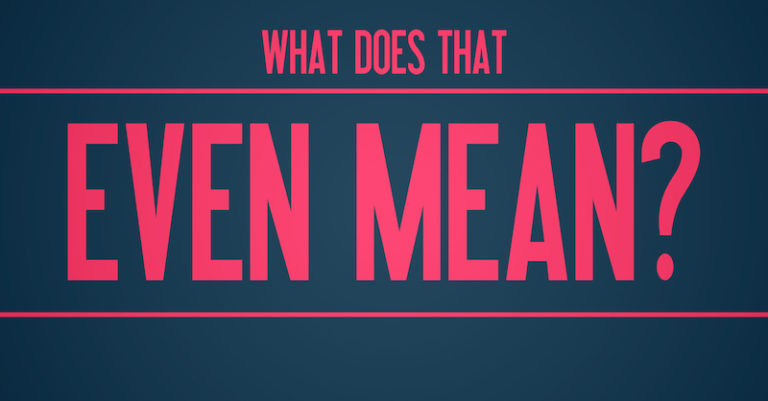What Does "Concept Is Everything" Really Mean for Screenwriters?

What does the common industry phrase "concept is everything" really mean?
"Concept is everything."
That's the mantra that you often hear in and around Hollywood — and it usually leads to discussions about high concept, low concept, and the strengths or struggles of the two.
High concept can be defined as a type of artistic work that can be easily pitched with a succinctly stated premise, typically characterized by an overarching "What If..." scenario that acts as a catalyst for the events and characterizations portrayed within the screenplay.
And if there's a high concept, there must be a low concept, right?
Many industry insiders would define low concept screenplays as those that are more concerned with character development and other subtleties that are not as easily summarized.
The truth is that most people don't really know what high concept or low concept truly means — not even industry insiders. But don't worry, there's a better element to focus on with your ideas.
Forget High and Low — Think Compelling
The most in-demand screenplays are those that have compelling concepts.
Compelling can be defined as evoking interest, attention, or admiration in a powerfully irresistible way.
Forget about whether or not your concept is high or low. The most desirable concepts are those that have the potential to evoke interest, capture attention, or build admiration in a powerful and irresistible way. And that can happen within any genre and under any budget — with studio tentpole movies or indie dramas.
Good Will Hunting is a perfect example of a compelling concept that is also concerned with character development and characterization not as easily summarized within the confines of a one-sentence logline.
Matt Damon and Ben Affleck initially developed the screenplay as a thriller about a blue-collar mathematics genius that was being pursued by the government, recruiting him to be a crypt-analyst spy.
Rob Reiner reviewed the script in its early stages and immediately told Damon and Affleck to get rid of the FBI plotline and focus on the characters.
The script went on to win an Academy Award and is considered one of the best character studies on film.
The suspense thriller version would likely have been pitched as a "high concept" script, but the character-focused version is still just as compelling.

A troubled janitor at M.I.T. has a gift for mathematics but needs help from a psychologist to find direction in his life.
Forget about definitions of high or low concepts. Do your best just to find a compelling concept.
Compelling Characters are Vital to the Concept
Every studio, production company, agency, and management company have read scripts with engaging concepts, big ideas, and enthralling worlds. They are aplenty within Hollywood. But it’s the scripts that pair those compelling concepts with compelling characters and character arcs that draw in the most interest in the spec market.
Genre movies like A Quiet Place and Get Out have excellent concepts but are further enhanced by well-conceived and well-written characters. And the great thing about both of these examples is that this strong character work isn’t lost within $200 million studio tentpoles. Compelling characters can shine in low-budget films as well.
And when you pair those two elements together — concept and compelling characters — Hollywood will be even more interested because the packaging of the eventual film or series will be that much easier.
Major actors will come calling, and the movie or series will be an easy sell thanks to the strong concepts that they are centered within. That’s the perfect storm in the eyes of the manager, agent, development executive, and producer.
So while, yes, concept is everything, it's even better when paired with compelling characters, which allows writers the ability to play in both "high" and "low" concept sandboxes.
Concept Gets You in the Door
The concept of your script is what gets you in the door.
It doesn't matter if it's an enthralling "What if..." concept or a small character drama — the concept is the sole factor of whether or not people will read your script and consider it for acquisition and production.
In that respect, concept is everything because it's the first element that opens the doors to Hollywood and beyond.
Yes, the more compelling your concept is, the more doors may open. But always remember that there's a place for every type of screenplay — as long as it's written well.
There are indie production companies that seek out character-driven pieces.
There are specialty studios that focus on dramas.
There are indie producers looking for the next small, quirky comedy.

But you must hone in on the central concept of your smaller stories so that you can adequately pitch them. That's why concept means so much to film and television industry insiders. It's the selling point of your script.
Is There a Market for Character-Driven Screenplays?
Yes. As we mentioned before, there's a market for every type of cinematic story — even quirky comedies and character pieces. We see them in theaters and on streaming channels. And we often see them in the running for Golden Globes and Oscars.
But they have to be well-crafted. The treatment of those types of stories has to showcase a masterful grasp on characterization and theme.
In development, these types of screenplays are often referred to as execution dependent, which means that the screenplay has to showcase highly-skilled writing and must be attached to great talent in front of and behind the camera.
Auteurs usually dominate this corner of the market through indie filmmaking, but plenty of strong character-driven dramas and quirky comedies have sold.
The script for Little Miss Sunshine was purchased from first-time screenwriter Michael Arndt for $250,000 by Marc Turtletaub, one of the film's producers.
Arnt's original plan was to shoot the film himself by raising several thousand dollars and using a camcorder, but he instead gave the screenplay to producers Ron Yerxa and Albert Berger. They teamed up with Deep River Productions to package the screenplay with a director, leading to the attachment of directing duo Jonathan Dayton and Valerie Faris.
While smaller, character-driven screenplays are less desirable than more compelling concepts, there is a market for everything. You just have to find the right people.
Market Your Concept Wisely
A marketing strategy is something that cannot be rushed. You have to take the time to do your research and approach the right people — people that are producing screenplays similar to yours in genre, tone, and budget.
Concept is everything within your marketing plan.
Give yourself a good chunk of time to do that necessary computer work and compile a long list of potentials before you send one single query out.
Read ScreenCraft's 7 Marketing Strategy Hacks for Screenwriters!
The Concept Is Everything mantra isn't about Hollywood's obsession with big tentpole genre flicks.
It's about finding compelling concepts.
It's about screenwriters doing everything they can to marry those compelling concepts with equally compelling characters.
It's about knowing the core concept of your screenplay so that you can use those loglines to get you in the door.
Read ScreenCraft's 101 Best Movie Loglines Screenwriters Can Learn From!
And it's about knowing your marketing and marketing that concept wisely.
Concept is everything.
Ken Miyamoto has worked in the film industry for nearly two decades, most notably as a studio liaison for Sony Studios and then as a script reader and story analyst for Sony Pictures.
He has many studio meetings under his belt as a produced screenwriter, meeting with the likes of Sony, Dreamworks, Universal, Disney, Warner Brothers, as well as many production and management companies. He has had a previous development deal with Lionsgate, as well as multiple writing assignments, including the produced miniseries Blackout, starring Anne Heche, Sean Patrick Flanery, Billy Zane, James Brolin, Haylie Duff, Brian Bloom, Eric La Salle, and Bruce Boxleitner. Follow Ken on Twitter @KenMovies
For all the latest ScreenCraft news and updates, follow us on Twitter, Facebook, and Instagram.
Tags
Get Our Screenwriting Newsletter!
Get weekly writing inspiration delivered to your inbox - including industry news, popular articles, and more!





























